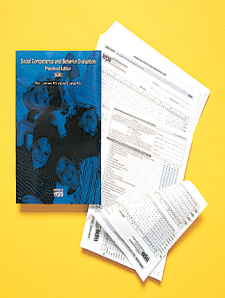Social Competence & Behavior Evaluation, Preschool Edition (SCBE)
| ||||||
|
| |||||||||||||||||||||||||||||||||||||||||||||||||||||||
|
Here is an alternative for clinicians and educators who evaluate young children. This exciting scale measures social competence, affective expression, and adjustment in children 21/2 to 6 years of age (or, more precisely, 30 months to 76 months).
Information That’s Helpful to Teachers
The primary objective of the Social Competence and Behavior Evaluation (SCBE) is to describe the child’s behavior for purposes of socialization and education, rather than diagnosis. It focuses on the child’s adaptation to and functioning within his or her environment–which is particularly relevant to teachers. The SCBE helps teachers design classroom interventions that address both the child’s strengths and weaknesses.
Social and Emotional Adjustment to the Classroom
Used for years as the Preschool Socio-Affective Profile, the SCBE has now been renamed and standardized on more than 1,200 U.S. preschool children. It includes 80 items that can be completed in just 15 minutes by a preschool, Head Start, or Kindergarten teacher. These items cover eight basic scales and four summary scales:
Basic Scales Summary Scales
Depressive-Joyful Social Competence
Anxious-Secure Externalizing Problems
Angry-Tolerant Internalizing Problems
Isolated-Integrated General Adaptation
Aggressive-Calm
Egotistical-Prosocial
Oppositional-Cooperative
Dependent-Autonomous
A Clearer Picture of the Preschool Child
Targeting an appropriately narrow age range, SCBE items focus not on obscure or pathological behaviors but on behaviors that are commonly observed among preschoolers. The SCBE is particularly useful to educators as a standardized description of a child’s social and emotional adjustment to the classroom setting. While many instruments for young children focus primarily on anger and hyperactivity, the SCBE measures a full range of behaviors and emotions–including anxiety and depression–that are relevant to the teacher and parent.
In addition, the scale’s high reliability makes it ideal for outcome assessment in experimental intervention programs. It is an excellent tool for evaluating the child’s ongoing adaptation at various ages.
Component
KIT: Includes 25 AutoScore Forms; 1 Manual



